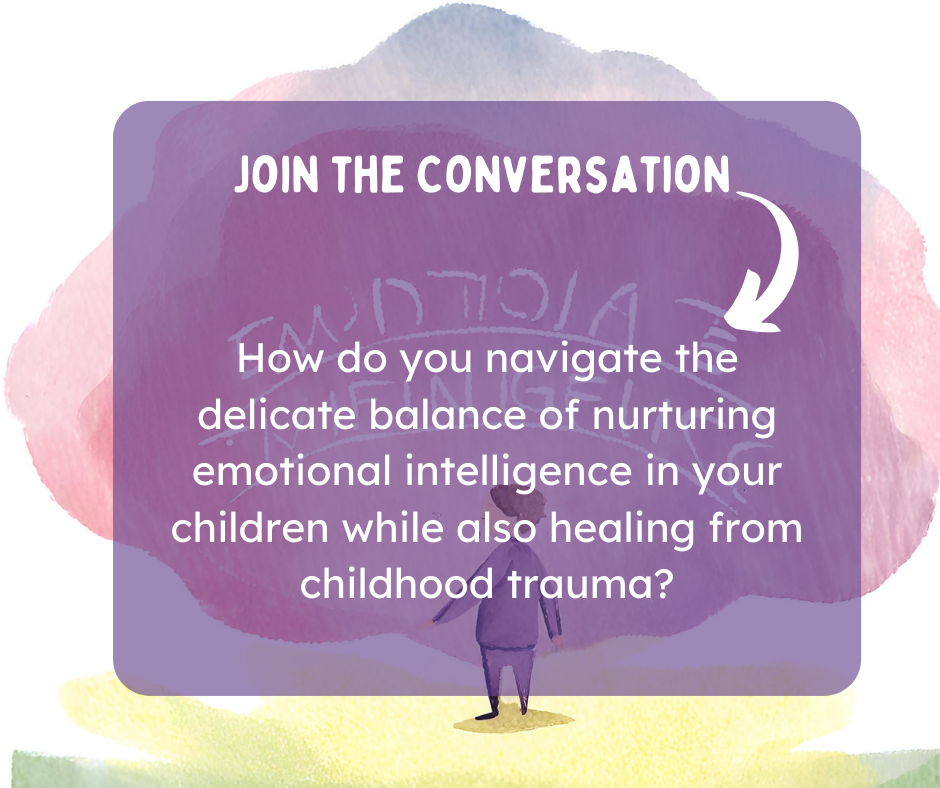You Matter: Helping Children Develop Self-Worth and Resilience After Trauma

Discover how to foster a deep emotional connection with your children, even while healing from your own childhood trauma. Danielle Burnock, who has lived this experience, will share her insights. Danielle, a mother and grandmother, faced her fears of passing on her trauma to her children and instead learned to ensure her children felt loved and valued. She'll share how she used tools like coloring books and word searches to initiate meaningful conversations about self-worth and personal growth.
1. How can childhood trauma impact parenting and grandparenting?
Childhood trauma can create a unique set of challenges in parenting and grandparenting. Often, there is an apprehension of perpetuating the cycle of trauma or the fear of not being able to provide emotional support due to one's own neglected childhood. However, as once a reluctant parent myself now turned into an adoring grandmother, I have uncovered insights and strategies that support the breakage of the trauma cycle and enable a healthier relationship with children and grandchildren. With much of my advice stemming from my personal journey, I've discovered the significance of unconditional love in the parent-child relationship.
I distinctly remember the monumental shift I made from the harsh disciplinary tactics of my upbringing to a more gentle, loving form of guidance for my own children. This journey wasn't solely centered on discipline but rather the evolution of being a parent. It was about understanding my children, their emotions, and individual personalities, and fostering a relationship based on trust and mutual respect. This approach of 'relational parenting' as I've come to know it, cultivated a strong family dynamic and armed my children with the ability to navigate their own adversities.
However, it's important to note that this transformation doesn't happen overnight and requires a deep level of self-reflection and personal growth. Recognizing your own trauma, seeking healing, and acquiring emotional intelligence are vital steps in this journey. More than just a method of raising children, it's about personal growth as well. There's a transformation that happens when you embrace your imperfections, own your mistakes, and acknowledge the fallibility of being human. This mindset shift has the potential to cultivate more empathy, understanding, and connection in your parenting style. Ultimately, the navigation of trauma within parenting and grandparenting is about finding the path to personal healing and translating that into a loving, supportive environment for the children and grandchildren in your life. This focus on healing, understanding, love, and support can significantly mitigate the impact of one's childhood trauma on their parenting and grandparenting journey.
2. What roles do emotional intelligence and empathy play in breaking the cycle of trauma?
Emotional intelligence and empathy play a critical role in breaking the cycle of trauma and fostering healthier parent-child relationships. The presence of these characteristics enables a parent to understand and respond effectively to their child's emotions, build trust, encourage open communication, and cultivate mutual respect. Emotionally intelligent parenting involves acknowledging your own emotions, validating your child's feelings, and using challenging situations as opportunities for learning and growth. By fostering an environment where children feel free to express themselves without fear of judgment, parents create stronger bonds with their kids, setting a foundation for emotionally healthy adulthood. In the heartfelt conversation with Danielle Burnock, she shared valuable insights on how emotional intelligence and empathy influenced her approach to parenting and grandparenting.
Coming from a tough childhood filled with trauma, Danielle intentionally adopted a different approach with her children, focusing on understanding their feelings, affirming their worth, and responding lovingly to their needs. As she transitioned into grandparenting, Danielle highlighted her continued dedication to understanding her grandchildren's emotions and empathizing with their experiences, bestowing the opportunity to shape their interactions in a more emotionally aware manner. The significance of the topic can hardly be overstated for parents seeking to heal from trauma and provide a better reality for their kids. Emotional intelligence and empathy don't merely create bonds; they empower children to forge their path with resilience and optimism.
Furthermore, the value of such an approach extends beyond the parent-child dyad to the broader family system and child development. By demonstrating emotional intelligence and empathy, parents can model to their children how to handle emotions and form healthy relationships. These lessons, grounded in their earliest years, lay a solid foundation for their future endeavors, carving out the path for them to become caring and understanding adults.
3. How can parents foster more meaningful conversations with their children about self-worth and trauma?
As parents, we often look for ways to build and foster a strong and profound connection with our children. The art of engaging in meaningful discussions with them about self-worth and trauma can seem daunting. This is particularly true considering the sensitive nature of such topics and the potential impact they can have on a child's mental and emotional growth. However, facing this challenge allows us to provide a secure environment for our children to openly discuss their feelings and concerns. By taking a gentle, patient, and understanding approach, we can help them navigate their emotions, reinforcing their self-esteem, and assuring them that their experiences and feelings are valid.
From Danielle Burnock's perspective, she advocates for the use of creative tools such as her books, which effectively use coloring pages and word searches to encourage these thoughtful conversations. Drawing from her personal experience, she brought into context how her unique methodological approach helps break down communication barriers, particularly when discussing complex topics of self-worth and trauma. Her contribution to the non-profit organization that worked with children battling leukemia showcases how effectively her resources can bring comfort and joy while creating dialogue about tough topics in an organic manner.
Moreover, she emphasizes the importance of 'relational parenting' wherein the parent-child relationship is fostered based on trust, respect, and open communication. Talking about self-worth and trauma could be challenging but is essential in parenting. The importance of this lies in cultivating a safe space within the family where children feel valued, understood, and loved. Such discussions help children better understand their self-worth and navigate their feelings about traumatic experiences. As Danielle demonstrated with her books, interactive and engaging tools can serve as excellent facilitators to enrich these critical conversations. Moreover, the approach to 'relational parenting' further strengthens the connections between parents and children, creating a nurturing environment that fosters growth, understanding, and mutual respect. This serves as a stepping-stone towards mitigating the impact of trauma, building self-worth in children, and flourishing as a cohesive and resilient family unit.

4. In what ways can activities such as coloring pages and word searches help parents connect with their children?
While we may relegate activities like coloring pages and word searches to the realm of mindless pastime, in reality, they can serve as potent tools to establish a deep emotional connection between parents and their children. Engaging in these simple yet innovative activities can help start crucial conversations in an enjoyable, less threatening way. It provides parents an avenue to broach sensitive topics like self-worth, self-esteem, and potentially even past traumas. There's something comforting about the shared experience of creation and discovery that these activities offer, creating a safe space for communication to naturally flow.
Moreover, by involving themselves in their children's leisurely activities, parents implicitly communicate their interest and commitment to them, fostering trust and encouraging open dialogue. During the conversation with Danielle Burnock, she detailed how her books are designed for facilitating deeper interaction between parents and their kids. Danielle shared an anecdote that beautifully illustrated the power of these methods: A nonprofit organization ordered multiple copies of her taco book, which included coloring pages, to distribute among children battling leukemia in local hospitals. This tangible application of Danielle's tools underscores the impact they can have, even under challenging circumstances. Danielle further emphasized the concept of relational parenting and how her books guide parents to engage with their kids on a deeper level. Through these fun, innovative formats, parents can create an intimate environment that encourages open conversations and mutual understanding.
Why does this matter to you, the reader?
Well, first and foremost, it offers an approachable framework for communication. We're often looking for ways to engage with our children without scaring them away or making them uncomfortable. This is particularly important in our fast-paced, screen-centric society where genuine connection can sometimes feel like a lost art. The beauty of activities like coloring pages and word searches lies in their simplicity and their power to bridge generational gaps. But more than just facilitating conversation, activities like these shift the focus from mere discipline to a relationship built on trust, empathy, and understanding. This approach helps in fostering positive experiences and instilling an environment of acceptance and love. It’s not just about completing an activity together, but rather it's an opportunity to step into your child’s world and let them know, unequivocally, that you care. It’s a parental approach that's about creating safe spaces for dialogue, fostering emotional connections, and building resilience in face of adversities, ultimately empowering parents and their children alike.
5. What is the significance of relational parenting in healing from childhood trauma and establishing stronger bonds with children?
Relational parenting plays a significant role in healing from childhood trauma and nurturing stronger emotional connections with children. This approach emphasizes direct interactions and intimate relationships between parents and children, rather than traditional hierarchical roles. By recognizing and validating the emotions, thoughts, and feelings of children, relational parenting creates an environment of mutual respect and understanding. It provides a safe space for open conversation, allowing the parent and child to communicate more effectively and foster a stronger emotional connection.
Reflecting on the exchange with Danielle Burnock, it's incredible how she navigated parenting through this relational lens, despite her personal experience with childhood trauma. Danielle's approach puts the child's emotional intelligence at the forefront of the parenting equation. From working through her own fears and allowing herself to be vulnerable, to owning up to her mistakes and consciously deciding not to hide them, Danielle laid a foundation of trust and open communication. Her commitment to treating her children as individuals with their thoughts and feelings helped in successfully breaking the cycle of trauma.
Even at the grandparenting stage, Danielle is utilizing her improved understanding of emotional intelligence to create authentic and empathetic connections with her grandchildren. Understanding the answer to this question opens up a meaningful shift in perspective for parents looking to navigate through their trauma and establish nurturing bonds with their children. It embodies the transformative power of love and intentional interaction. While it may seem daunting to break down the established norms of the parent-child hierarchy, the potential emotional reward makes it worthwhile. The beauty of relational parenting resides in its simplicity - treating children as individuals with their own emotions and needs, acknowledging your mistakes, and building a relationship based on trust and respect. Recognizing these elements empowers parents to heal from their past trauma and foster stronger bonds with their children. Ultimately, your children will remember not just what you did for them, but how you made them feel, and establishing that connection of mutual love, respect, and understanding is a beautiful legacy to leave them.
Parenting doesn't come with a handbook, and every parent has their unique challenges to overcome. However, when these challenges involve confronting and healing from childhood trauma, the stakes are higher and the journey tougher. Danielle Burnock's personal experiences and insights serve as a beacon of hope and affirmation for parents navigating these rough waters. Her emphasis on relational parenting, being open about our shortcomings, and growing from them, offers invaluable guidance. Remember, no one is perfect. The most important thing is to ensure that our children feel loved and supported.
Connect with Danielle here: https://www.daniellebernock.com/


